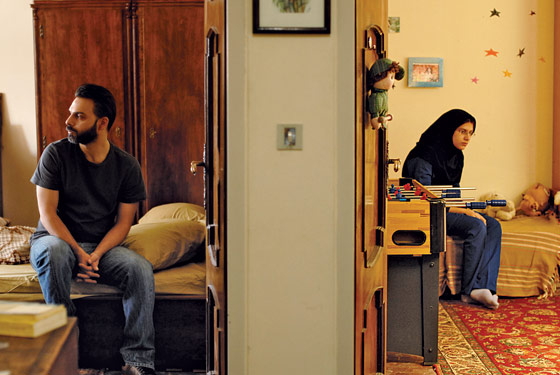
There are win-win scenarios, and then there is Asghar Farhadi’s acclaimed Iranian drama A Separation, which could have been called Lose-Lose: All its characters—male and female, comfortable and debt-ridden, secular and fundamentalist, old and young, senile and unborn—end up devastated or worse. Everyone is compelled to lie. Justice is impossible. There is no common ground. It is, in short, a thoroughly depressing movie, sparely photographed but rich in horribleness. What makes it so good is that no one is bad. These humans, desperate to do right, are caught up in a perfect storm of inhumanity. The evil is in the ecosystem.
The trajectory is stark. A Separation opens with a lengthy shot of a secular couple, Nader (Peyman Maadi) and Simin (Leila Hatami), who speak to—and ultimately yell at—an unseen male judge behind the camera. Pretty Simin with her brightly dyed red hair wants a divorce, not because Nader is bad but because he refuses to leave the country—or his dad, who has Alzheimer’s—for a place with opportunities for their 11-year-old daughter, Termeh (Sarina Farhadi, the director’s daughter). The judge, who doesn’t see why anyone would ever want to leave, says Termeh can’t go without her father’s permission and refuses to grant the divorce. (“My finding is that your problem is a small problem.”) Angry but with little recourse, Simin moves out of the family’s spacious apartment and in with her parents, leaving Termeh behind. So Nader hires a poor, religious pregnant woman, Razieh (Sareh Bayat), to come in every day and clean and look after the enfeebled old man.
Observe the multiple separations between basically decent people: between Nader and Simin; between Nader and Razieh, whom he overworks, underpays, and expects to change his father’s soiled trousers despite her religiously enforced modesty, putting her in multiple untenable positions; and between Razieh and her angry husband, Hodjat (Shahab Hosseini), who doesn’t know she’s working and wouldn’t let her if he did, although he’s besieged (and, at one point, imprisoned) by creditors. Farhadi has a detached, somewhat clinical style, as if he’s photographing specimens in a terrarium. But they are lively and headstrong specimens, convinced of their own free will. They think they see the whole picture, even if they’re living in disparate worlds.
The first third of A Separation sets up the tragedy; the rest chronicles the attempt at justice via Iran’s byzantine legal system, in which various parties make impassioned statements (and scream and plead) before being thrown into the street or into jail. Apart from a couple of murky fracases, the film has little violence, yet there’s rage—and the threat of eruption—in every frame, particularly against women. We fear for Razieh, her unborn child, and her watchful, bright-eyed little daughter, Somayeh (Kimia Hosseini); and we fear for Termeh once Razieh’s husband, Hodjat, becomes obsessed with vengeance for an injury against his wife.
Although Farhadi is plainly contemptuous of institutionalized sexism and the ruling class’s not-so-charming sense of entitlement, A Separation is a social critique without a human villain. The most instantly dislikable character, Nader, becomes increasingly sympathetic as the criminal case against him mounts: He is blinkered, childish, and intemperate, but a murderer? Maadi’s performance is a study in moral discombobulation, a layer of certainty atop a layer of hopeless confusion, while Hosseini, as his lower-class, religious antagonist, is a volcanic mixture of shame and self-righteousness. The women are emotionally steadier but with far fewer options in life. Your heart goes out to Bayat’s Razieh as she phones a religious authority and asks permission to change an old man’s fouled pants. On the one hand, it’s forbidden; on the other, he can’t just marinate in his waste; on the other hand, what would her husband say? The two young girls, Termeh and Somayeh, have a moment amid the madness in which they gaze into each other’s eyes as if searching for a sign of intelligent life.
Watching A Separation might well be a different experience for Westerners than for denizens of Iran or similar cultures. We’ll register the milieu’s oppressiveness, which they’ll take as a given. Perhaps they’ll focus instead on the spirit of the female characters, seeing sparks of subversiveness where we see servitude. No matter: We’ll all have plenty to talk about afterward.
A Separation
Directed by Asghar Farhadi. PG-13.
E-mail: filmcritic@newyorkmag.com.
